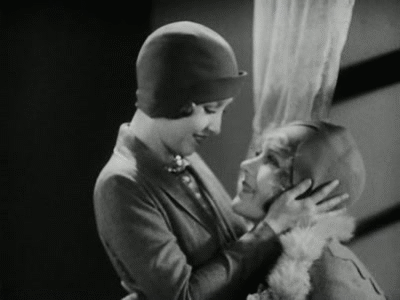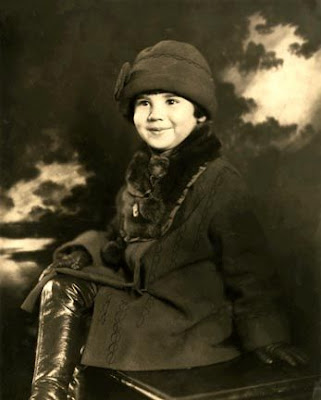On Saturday I went to the Silent Movie Theatre and saw The Goose Woman (1925), starring Louise Dresser and Jack Pickford. The film was accompanied by the wonderfully talented, Cliff Retallick and I always know it will be a great time when Cliff is behind the keys.
I didn't know what to expect with this film because I had never seen it before. I hadn't even heard much about it to be honest. I expected a silent film drama full of theatrics and close ups of crying faces, and while I did get that, there was also a lot more to this film.
The film is based off of a murder case that occurred in New Jersey in 1922. The woman in the New Jersey case, however, was referred to as "The Pig Woman" because she was a pig farmer. The case also didn't involve her son or any relation of hers, whereas in the film The Goose Woman unknowingly pins the crime on her son. Also, in true Hollywood fashion, the crime in the film is solved while the real crime remains unsolved.
One of the best things about this film is the performance by Louise Dresser. Louise was in her late 40's when the film was made and she didn't mind stripping off the make up and the glamour to play a woman who was constantly drunk and living in a shack surrounded by hundreds of geese. Normally I don't like when an actor looks at the camera, (don't ask me why, it just bugs me), but when Louise does it, you can see the anguish and pain in her eyes. When she is eventually given a makeover by the detectives to get her ready for the sensational murder trial she is the star witness of, she just lights up inside and out and becomes a totally different person.
Jack Pickford's portrayal of the Goose Woman's son, Gerald, deserves recognition as well. Most of the time Jack is seen as just Mary Pickford's drunken, wild child younger brother and his own film career is barely given a mention. I think Jack would have had a career even without the Pickford name. He was good looking, charismatic, and he was talented! He could play adventurous and rowdy boy roles like Tom Sawyer, or a young man just trying to get the approval and love of his mother like he does in this film.
While watching this film and seeing Jack being interrogated in the police station, I couldn't help but think about how five years earlier he was being questioned by police about the death of his wife, Olive Thomas. As most silent film fans know, one night while the couple was in Paris, Olive ingested mercury bi-chloride. Whether this was accidental or intentional is still debated, but most people (including the police) agreed that Jack had nothing to do with it. I have heard him described as someone who would be more apt to hurt himself (with his drinking and drug use), but not someone that would hurt anyone else.
It does need to be stated, however, that there were a couple of times during the movie where not just me, but also my friend, uttered a, "Huh?" or "Wait, what?" One of these instances was when the Goose Woman tells her son about where he came from. Now, it is explained early on in the movie that the Goose Woman, whose real name is Marie de Nardi, was a famous opera singer who was lauded around the world for her beautiful voice. She ended up having a child out of wedlock (we are lead to assume) and for some reason, this ruined her voice. How that works, I do not know.
Anyway, because of the loss of her voice, she resented her son. According to her, he ruined her career and this eventually lead her to alcoholism. While telling her son this story years later she starts to say, "Your father and I were..." and she is stopped before she could finish. What the hell was she going to say?! Her son's crying and instant depression makes it even more confusing. He then goes to his fiance's house (played by Constance Bennett) and begins to tell her what he just learned, but can't seem to say it out loud. He then walks over to the desk and starts to write his name on a piece of paper and the pen begins to leak ink...and for some reason this seems to make the whole situation clear to his gal! The one time in a silent film when you wish you could have dialogue just to know what the hell was going on!
I am gonna spoil the ending for you, so if you don't want it spoiled, don't read! However, I should also note that if you can't guess how this movie ends while watching it, you might need to go back to Kindergarten.
So, Gerald is being held at the police station and his mother, supposedly being the only one who can identify the killer, is brought in. When she sees that the supposed killer is her son, she runs to him, overcome with remorse. She holds her son and proceeds to tell the police that she made the whole story up and she hadn't witnessed the murder at all. And RIGHT on time the real killer comes into the station and confesses. (I love when things work out so smoothly!) Mother and son continue to hug while the police chief pulls out a crossword puzzle...because apparently the crime is solved and no charges will be brought against the Goose Woman for lying. JUSTICE!
All in all I will say this is a film definitely worth watching. If you are lucky enough to see it played in a theater with live accompaniment, it is 10x better. Who am I kidding, that is ALWAYS the best way to see a silent film!
I would love to hear from anyone else who has seen the film and get their thoughts and comments on it as well!










































